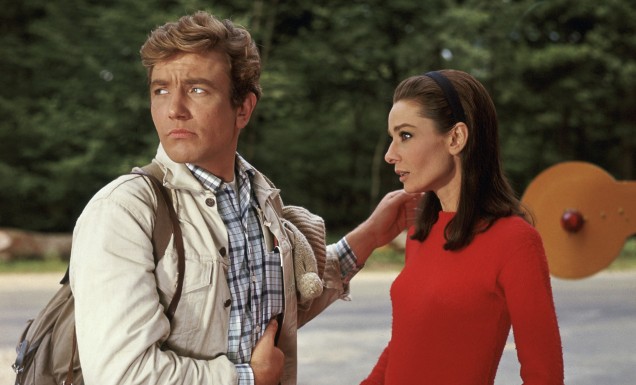Two for the Road
romantični, Ujedinjeno Kraljevstvo, 1967
DIRECTED BY: Stanley Donen

CAST:
Audrey Hepburn,
Albert Finney,
Eleanor Bron,
William Daniels
SCRIPT:
Frederic Raphael
PHOTOGRAPHY:
Christopher Challis
MUSIC:
Henry Mancini
EDITING:
Madeleine Gug,
Richard Marden
Synopsis:
London during the second half of the 60s of the last century.
Architect Mark Wallace and his wife Joan decide to travel to France, on the Cote d'Azur, not only to meet there with Mark's wealthy client Maurice Dalbret, but also to try to overcome the crisis in which their marriage fell after 12 years of living together.
Mark's task is that in St. Tropezu inspects the house he designed for Dalbret, but during the trip and stay on the idyllic Cote d'Azur, both he and Joan will recall happy but also sad events and situations that marked their long-term relationship. Their memories of the time they met and then got married will be awakened, as well as the years in which they had children, but also the many trials they faced during the last 12 years, which ultimately led to their marriage and reached a crisis.
When they were younger, Mark and Joan enjoyed each other's company, and both of them have fondest memories of the time when he was courting her and when they were happily in love traveling through the French countryside. But the former flirting and cheerful teasing have meanwhile been replaced by banal everyday life and boredom, and although both would like to rekindle the old ardor, what further threatens to tear them apart is mutual infidelity.
In 1968, it was nominated for an Oscar in the category of the best original screenplay, for which the distinguished American writer, actor and screenwriter Frederic Raphael, among others (co)author of the templates for the films Far from the Wild Crowd by John Schlesinger and Eyes Wide Shut by Stanley Kubrick, will win the same year nominated for the most prestigious British film award BAFTA, and also nominated for the Golden Globe in 1968 in the categories of best actress and most successful original score, the humorous romantic drama that won the prestigious festival in San Sebastián the year before is another recognizable achievement of director Stanley Donen , the author of some of the most famous musicals from the classic period of that genre.
The director of the timeless hit Pjevajmo na kiši, according to many the most successful musical of all time, who during his half-century-long career signed the extremely charming and highly watched titles Seven Brides for Seven Brothers, Funny Face and Charade, and towards the end of his career he also directed a music video for the song Lionel Ritchie's Dancing on the Ceiling and musical points in one episode of the popular TV series Random Partners, masterfully enriched the musical genre with the ingenious use of urban exteriors in the dance segments, reaching for cultural implications, for example in the sequence in the anthropological museum in the film Into the City! with Gene Kelly, who often collaborated in his films as a co-director, and later with ironic associations with existentialism and a playful color that was in harmony with pop art. We find some of that in the film A Journey for Two, which also contains elements of melodrama, and in which the director skilfully balances between more casual and charming passages on the one hand, and anxious and melodramatic passages on the other.
A special feature of this film is the non-linear narrative structure, which at the time of its creation was considered innovative and even a kind of experiment, in which the events that follow chronologically later are shown at the very beginning. The virtues of the work are an honest, sufficiently authentic and unbiased approach in depicting the shared life of two people who are quite different from each other, profiling the characters with noticeable altruism and playful humor, and subtly emphasizing the journey itself as something that possesses immanent importance and beauty.
Credit for the success of the film, which as a whole deservedly remained in the shadow of Donen's more important achievements, goes to the composer of the great music, Oscar winner Henry Mancini, and the award-winning director of photography Christopher Challis (also Donen's Arabesque, The Private Life of Sherlock Holmes by Billy Wilder), as well as extremely moody interpretations of the irresistible Oscar winner Audrey Hepburn (Holiday in Rome) and the reliable character actor Albert Finney (Peter Yates' Wardrobe, John Huston's Under the Volcano, Miller's Crossroads by the Coen brothers), who won Oscar nominations as many as five times.
Text author: Josip Grozdanić
color, 126'